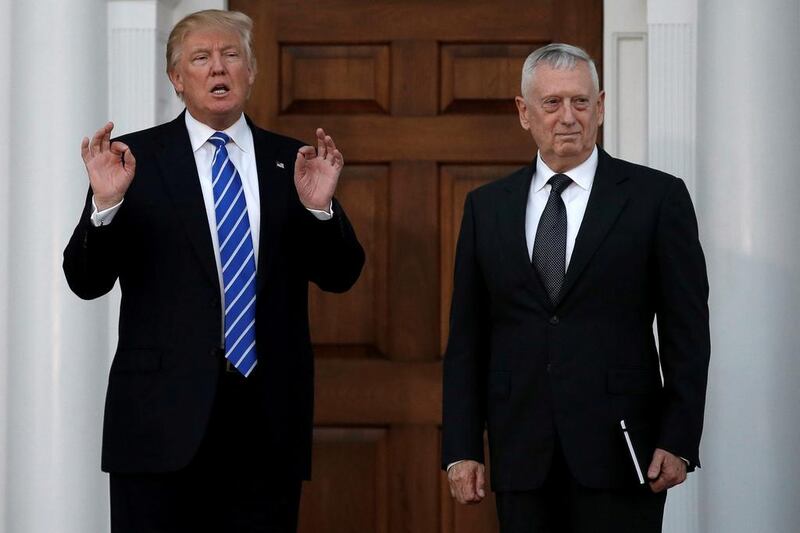WASHINGTON // President-elect Donald Trump continues to break with customary practice by appointing retired Marine Corps general James Mattis as his secretary of defence. For the first time since just after the Second World War, the Pentagon will not be run by a civilian.
While he is said to be “the most revered marine in a generation”, Gen Mattis is a lesser-known quantity outside the military sphere. But a man – even if he did retire three years ago – whose nickname is “Mad Dog” is bound to excite interest.
Born in Pullman, Washington state, the 66-year-old bachelor spent almost 45 years in the Marine Corps and has more than 30 years’ experience in the Middle East.
He first served there in 1979 as an infantry company commander. As a lieutenant colonel he led an assault battalion into Kuwait during the first Gulf War against Iraq in 1991. As head of Central Command from 2010 until his retirement in 2013, he was in charge of both the wars in Iraq and Afghanistan.
In the aftermath of the September 11 attacks in 2001, Gen Mattis commanded the Marines who launched an early amphibious assault into Afghanistan and established a foothold in the Taliban heartland.
As the first wave of Marines moved toward Kandahar, gen Mattis declared, “The Marines have landed, and now we own a piece of Afghanistan.” Two years later, he helped lead the invasion into Iraq in 2003 as the two-star commander of the 1st Marine Division.
Senator John McCain, chairman of the US senate armed services committee and himself ex-military, hailed Gen Mattis, as “one of the finest military officers of his generation and an extraordinary leader who inspires a rare and special admiration of his troops”.
To describe him as “battle-hardened” is an understatement. But the job of defence secretary also requires diplomacy and the general’s skills in that department are less certain and his selection raises questions about increased military influence in a job designed to ensure civilian control of the armed forces, and whether a recently retired service member is more likely to reach for military solutions to international problems rather than take a broader, more diplomatic approach. After all, this is man who once said his modus operandi was to “be polite, be professional, but have a plan to kill everybody you meet”.
In 2005, he raised eyebrows when he told a San Diego forum: “Actually, it’s a lot of fun to fight. You know, it’s a hell of a hoot ... It’s fun to shoot some people. I’ll be right up front with you, I like brawling. You go into Afghanistan, you got guys who slap women around for five years because they didn’t wear a veil. You know, guys like that ain’t got no manhood left anyway. So it’s a hell of a lot of fun to shoot them.”
The general was advised to choose his words more carefully.
A year later, he came under scrutiny during one of the more high-profile criminal investigations of the Iraq war, the shooting deaths of 24 Iraqis by Marines. The Iraqis, who included unarmed women and children, were killed by Marines in the town of Haditha after one of their comrades was killed by a roadside bomb. Eight Marines were charged in connection with the killings. Four enlisted men were charged with unpremeditated murder, and four officers who were not there at the time were accused of failing to report or investigate the deaths. As commander of the parent unit of the accused Marines, the 1st Marine Expeditionary Force, it was Gen Mattis who ultimately dismissed the charges against most of the Marines.
An extended meeting with Gen Mattis at the Trump National Golf Club in Bedminister, New Jersey, on November 19 impressed the president-elect. In a tweet he referred to him as “a true general’s general”.
Later, Mr Trump said the blunt-talking general had even made him rethink his campaign pledge to revive waterboarding, an interrogation tactic used against suspected terrorists that president Barack Obama had banned.
"He [Mattis] said, 'I've always found, give me a pack of cigarettes and a couple of beers and I'll do better,"' the president-elect told the New York Times.
Gen Mattis is unashamedly hawkish, calling Mr Obama’s nuclear deal with Iran “an arms control agreement that fell short” and the Tehran regime “the single most enduring threat to stability and peace in the Middle East”.
He also has strong views on Israeli settlements, believing they have caused hopes of a two-state solution to wane. He told the Aspen Security forum: “If I’m Jerusalem and I put 500 Jewish settlers out here somewhere to the east and there’s 10,000 Arab settlers in here – if we draw the border to include them, either it ceases to be a Jewish state or you say the Arabs don’t get to vote. Apartheid. That didn’t work too well the last time I saw that practised in a country. So we’ve got to work on this with a sense of urgency.”
Mr Trump announced his choice of defence secretary at a rally in Cincinnati. For Gen Mattis to be confirmed, Congress would first have to approve the bypassing of a law that bars retired military officers from becoming defence secretary within seven years of leaving active duty. The only previous exception to the seven-year rule was retired general George C Marshall in 1950-51.
While Mr Trump has made it clear that he wants the US to pull back from many foreign entanglements, Gen Mattis has argued for a more assertive role.
“Mattis, with his unvarnished approach to calling it like he sees it, is likely to provide president-elect Trump with an early test: does Trump value loyalty over the truth?” said Tom Ricks, national security fellow at the New America Foundation. The future president Trump may need to keep those cigarettes and beers handy.
* Associated Press





